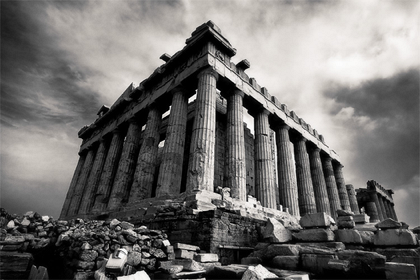| Online: | |
| Visits: | |
| Stories: |

| Story Views | |
| Now: | |
| Last Hour: | |
| Last 24 Hours: | |
| Total: | |
Chet Raymo, “A Fear of Freedom?”
Wednesday, February 19, 2014 19:11
% of readers think this story is Fact. Add your two cents.
“A Fear of Freedom?”
by Chet Raymo
“It is almost a cliché to say that Western civilization was created by the Greeks. Our government, law, art, music, architecture, literature, drama, historiography, science, and mathematics are largely Greek inventions. The sublime refinement and sophistication of the Parthenon have been widely taken as reflecting qualities of the Athenians citizens who built the temple and adorned it with sculptures.
No doubt something remarkable happened in the Greek world of the 6th to 3rd centuries B.C.E., with its epicenter first at Athens, then at Alexandria. But Connelly reminds us of the lingering hold of the mythological past on the Greek psyche.
In his book “The Greeks and the Irrational”, the scholar E. R. Dodds was thinking of Greek culture when he wrote: “Despite its lack of political freedom, the society of the third century B.C. was in many ways the nearest approach to an ‘open’ society that the world had yet seen, and nearer than any that would be seen again until modern times.” It was a society confident of its powers, says Dodds. Aristotle had asked his fellow citizens to recognize a divine spark within themselves: the intellect. Men and women who exercise reason can live like gods, he said. For Zeno, the human intellect was not merely akin to God, it is God, a portion of the divine substance. Temples are superfluous, Zeno said; God’s true temple is the human intellect.
But the seeds of irrationality were also there, embedded in popular culture, or perhaps embedded in human nature. Soon enough supernaturalism returned. Astrology and magical healing replaced astronomy and medicine. Cults flourished, rationalists were scapegoated, and the scientific culture perfected at Alexandria began to decline. The old dualisms- mind and matter, gods and mortals, soul and body — which the rationalists had striven to overcome, reasserted themselves with fresh vigor.
Dodds calls it “the return of the irrational,” and speaks of a “fear of freedom — the unconscious flight from the heavy burden of individual choice which an open society lays upon its members.” Connelly might be inclined to say that the irrational never went away, and that for all their innovative gifts, the Greeks never learned to stand on their own without the support of the gods, clinging to the foundational myths that exalted them above “the others.”
Plus ça change, plus c’est la même chose.”
- http://blog.sciencemusings.com/
Source: http://coyoteprime-runningcauseicantfly.blogspot.com/2014/02/chet-raymo-fear-of-freedom.html




